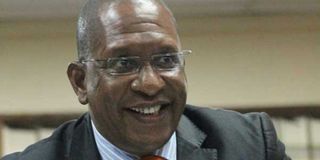Cabinet nomination was the easier route to forcing Tobiko out of office

Mr Keriako Tobiko. Cabinet nomination was the easier route to forcing Tobiko out of office. FILE PHOTO | NATION MEDIA GROUP
What you need to know:
The most vexing issue was how to cox Mr Tobiko into leaving his constitutional office without offending the supreme law and the Maa community from which he hails.
Mr Tobiko’s term was to come to an end in 2019 and, as per the Constitution, only a tribunal could force him out of office.
Mr Tobiko, alongside Mr Muhoro, were key cogs in the Governance, Justice, Law and Order Sector – which also includes the Judiciary.
The easing out of Keriako Tobiko from the high office of Director of Public Prosecutions (DPP) was a shocker to Kenyans but, to key observers of President Kenyatta’s moves, it was long overdue.
The most vexing issue was how to cox Mr Tobiko into leaving his constitutional office without offending the supreme law and the Maa community from which he hails.
The DPP’s office was hived off from the Attorney-General’s office and created as an independent institution by the 2010 Constitution.
Mr Tobiko’s term was to come to an end in 2019 and, as per the Constitution, only a tribunal could force him out of office.
Tribunals are prone to political machinations and take too long to deliver a verdict; therefore the idea was discarded only for the President to settle on the easiest way out which was to ask Mr Tobiko to hand in a formal resignation, sources indicated.
RESIGNED
It was not immediately clear when Mr Tobiko resigned and efforts to get his comments were futile as he did not answer his mobile phone.
Sources told the Nation that Mr Tobiko was offered a soft landing by being nominated for the position of a Cabinet Secretary in line with government practice of never letting go at once an individual who holds sensitive information by virtue of his job.
For instance, retiring military generals are offered parastatal jobs or ambassadorial posts once they retire.
Director of Criminal Investigations (DCI) Ndegwa Muhoro was referred to the Public Service Commission for redeployment.
“For Mr Tobiko, he gets a cabinet position thereby allowing him to build himself with the aim of taking a stab at politics in future, but also to neutralise any political noise that could have come from Maasailand,” said a source.
JUDICIARY
Mr Tobiko, alongside Mr Muhoro, were key cogs in the Governance, Justice, Law and Order Sector – which also includes the Judiciary.
In November 2015, President Kenyatta had directed the formation of a multi-agency team to jointly deal with corruption, economic crimes, organised crimes as well as cartels and syndicates.
The membership comprised Ethics and Anti-Corruption Commission, Director of Public Prosecutions, National Intelligence Service, Financial Reporting Centre, Asset Recovery Agency, Kenya Revenue Authority and Office of the President.
CORRUPTION
During the State House Summit held in 2016, President Kenyatta complained that despite Parliament making money available to all the agencies, there was little to show in the fight against corruption.
Anti-corruption chiefs had defended themselves against criticism that they had failed to end runaway graft. In the end, each agency exonerated itself, passing the blame of inaction to others.
The Judiciary passed the blame to the DPP’s office, arguing that it was filing weak cases which could not sustain any convictions.
Justice Paul Kihara, the president of the Court of Appeal, told the audience it is not judges or magistrates to be blamed if suspects walk free.





